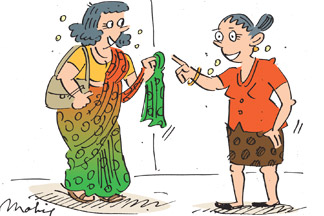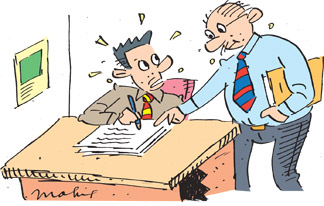|

by R. S. Karunaratne
Word order of adjectives
An adjective is a word that describes a person, an animal, a plant, a
place or a thing and tells the reader or listener about one of its
qualities. An adjective usually comes before a noun or after a ‘be’
verb.
Adjectives used before the noun
A beautiful girl was picked as the Avurudu Kumari.
|

This is a huge whale. |
A brave soldier will not run away from the battlefield.
Father bought me an expensive laptop.
An important appointment prevented me from attending the school
prize-giving ceremony.
We ran to the sea-shore to see the rare fish caught by a fisherman.
My uncle still drives his old Morris Minor car.
Adjectives used after a ‘be’ verb
My aunt is beautiful
This is a huge whale.
Your shirt is light blue.
My brother is tall.
This is an expensive ring.
When we use two or more adjectives from different groups before a
noun, we follow the following order:
1. Quality (intelligent, cheap, rare)
P>2. Size (small, big, enormous)
3. Age (ancient, modern, young)
4. Shape (round, square, triangular)
5. Colour (red, blue, yellow)
6. Nationality (Chinese, French, Russian)
7. Material (wooden, gold, cotton)
When we use adjectives from different groups before a noun, we do not
use a comma or ‘and’.
Mary makes pretty blue denim dresses for teddy bears.
Nalin wears an expensive modern Japanese wristlet.
|

Sita is wearing a green and yellow sari. |
They sold a rare big round gem for Rs. 50,000.
ABC company sells small modern Japanese computers.
The hotel served us the food in a cheap round aluminium plate.
When we use two quality adjectives together, we use a comma or ‘and’.
After making a long, uninteresting speech the speaker sat down.
A handsome, talented actor played the lead role.
An intelligent and efficient secretary is looking for a job.
When we use two colour adjectives before a noun or after a ‘be’ verb,
we use ‘and’ between them.
Sita is wearing a green and yellow sari.
Sam bought a blue and silver carpet.
We chose the brown and black wallpaper.
Raja is driving a black and silver car.
When we use more than two colour adjectives together, we use both a
comma and an ‘and’.
The building was painted in white, yellow and green.
Mother preferred the brown, black and purple bedspread.
The magazine carried a light blue, pink and yellow picture on its
cover page.
Confusable words
Even a slight change in the spelling of a word can affect its
meaning. Some words, at the first glance, look alike. However, if you
look at them closely, you will note the difference in spelling. Here is
a carefully selected list of confusable words for your word bank.
1. Abnegate / abrogate
To abnegate is to deny oneself. Abnegation is self-denial. It is
practised in certain religions. Abrogate is to repeal a law or an
agreement. The government has decided to abrogate certain clauses in the
new Act.
2. Abnormal / subnormal
Abnormal means ‘not normal’. Abnormality is an irregularity.
Subnormal means ‘below normal’. People with low intelligence are
referred to as subnormal
3. Abstruse / obtuse
If something is abstruse , it is difficult to understand. Some parts
of philosophy are abstruse . Obtuse means ‘dull or stupid’. Most
teachers have experience in dealing with obtuse students.
4. Abuse / misuse
Both words have the same range of meanings: to insult or maltreat.
Misuse has a milder connotation than abuse .
Some people misuse their talents. However, abuse has condemnatory
overtones. So, we have terms such as child abuse and drug abuse.
5. Accede / agree
Accede is a pompous word for agree . Today accede is confined to
legal documents. In all other places, say ‘agree’.
6. Ascent / assent
Both words have the same pronunciation. Ascent is the act of climbing
upwards. Assent is ‘to express agreement.’ A royal assent is necessary
for an Act passed in the Houses of Parliament.
7. Accept / except
To accept is ‘to receive something or to agree with something.’ We
accept to abide by the law. Except means ‘to exclude or omit’. All
students except Ramiah went on the annual trip.
8. Acoustics
Acoustics is a plural noun meaning ‘the shape or design of a theatre
that makes it good or bad for carrying sound.’ As a subject it is a
singular noun. Acoustics is his favourite subject.
9. Activate / motivate
Activate is ‘to make something start working.’ Activate the burglar
alarm. Motivate is ‘to encourage.’ Some teachers are good at motivating
their students.
10. Actor / actress / author / authoress / poet / poetess / sculptor
/ sculptress
Feminists feel that ‘actress, authoress, poetess’ and ‘sculptress’
are inferior, expressions. So, today we use ‘actor, author, poet, and
sculptor to refer to both males and females. However, we still use ‘hero
: heroine; heir: heiress; waiter: waitress and god: goddess.
Starters:
How to use negatives
We usually use ‘not’ (n’t) to make the negatives. Study how the
following positive statements are turned into negative statements by
using ‘not’ (n’t).
Positive: I am tired. / I’m tired.
Negative: I am not tired. / I’m not tired.
P: We are tired. / We’re tired.
|

Sign here. |
N: We are not tired. / We aren’t tired.
P: You are tired. / You’re tired.
N: You are not tired. / You aren’t tired.
P: He is tired. / He’s tired.
N: He is not tired. / He isn’t tired.
P: They are tired. / They’re tired.
N: They are not tired. / They aren’t tired.
P: I will be here tomorrow. / I’ll be here tomorrow.
N: I will not be here tomorrow. / I won’t be here tomorrow.
P: I would like to be a doctor. / I’d like to be a doctor.
N: I would not like to be a doctor. / I wouldn’t like to be a doctor.
P: She can sing.
N: She cannot sing. / She can’t sing.
P: He could do it.
N: He could not do it. / He couldn’t do it.
P: You must come.
N: You must not come. / You mustn’t come.
To form the present simple negative use ‘do not’ (don’t) for ‘I, we,
you, they’ + infinitive.
I don’t want to meet him.
We don’t wish to harm innocent animals.
You don’t study to pass the exam.
They don’t read to improve their knowledge.
We use ‘does not’ (doesn’t) with ‘he, she, it” + infinitive.
He does not like to write essays.
She doesn’t dance to please others.
The dog doesn’t wag its tail to welcome visitors.
We use ‘did not’ (didn’t) with ‘I, we, you, he, she, it, and they’ +
infinitive.
I didn’t study well to pass the exam.
We didn’t dance to impress others.
You didn’t want to answer all the questions.
He didn’t learn how to drive.
She didn’t care to smile with me.
The dog didn’t bark at strangers.
For the imperative we use ‘don’t’ at the beginning of a sentence.
Positive: Look at me.
Negative: Don’t look at me.
P: Go away.
N: Don’t go away.
P: Do it.
N: Don’t do it.
P: Sign here.
N: Don’t sign here.
[Activity]
Complete the following sentences with negative verbs. Check your
answers with the key.
1. The sun is shining.
It ...................... raining.
2. Gamini isn’t rich.
He ....................... got much money.
3. Would you like to have some tea?
No, I .................. thirsty.
4. I .................. hear you.
Please speak a bit louder.
5. Kamal ................... read newspapers.
He is illiterate.
6. I don’t like this house.
It ................ very big.
7. Where’s my purse?
I ................ know.
8. Father .................. go to office yesterday.
He was ill.
9. She ................ take an umbrella.
It wasn’t raining.
10. I have been to India but I ................... been to Japan.
------------
Key:
1. isn’t 2. hasn’t 3. am not 4. can’t 5. can’t 6. isn’t 7. don’t 8.
didn’t 9. didn’t 10. haven’t
----------------
Find synonyms
Synonyms are words having similar meanings. Here is a simple test to
gauge your knowledge of synonyms. Look at the following list of words
and find their synonyms. To facilitate your task the first letter of
each synonym is given. Check your answers with the key.
1. Abandon: D ..............
2. Abate: D ...................
3. Abbey: M ...................
4. Abbreviate: S .................
5. Abdicate: R ..................
6. Abdomen: B ..................
7. Abduct: K .....................
8.Aberration: D ..................
9. Abhor: H ...................
10. Abide: B .....................
11. Ability: C .................
12. Abject: C ....................
-----------------
13. Ablaze: F .......................
14. Able: C ........................
15. Abnormal: O ................
16. Abolish: N ....................
17. Abominable: L ..................
18. Abort: M ...................
19. Abortive: F ..................
20. Abound: F .......................
21. About: R ..........................
22. Abrasion: S ....................
23. Abridge: S ....................
24. Abroad: O .........................
-----------------
Key
1. Desert 2. Decrease 3. Monastery 4. Shorten 5. Renounce 6. Belly 7.
Kidnap 8. Deviation 9. Hate 10. Bear 11. Capability 12. Contemptible 13.
Flaming 14. Capable 15. Odd 16. Nullify 17. Loathsome 18. Miscarry 19.
Failed 20. Flourish 21. Regarding 22. Scratch 23. Shorten 24. Overseas
-----------------------------------
One word for many
Here’s an interesting word game. Look at the following group of words
and give one word for each. To facilitate your task we have given the
first letter of the single word. Check your answers with the key.
1. Objects, materials or processes that do not occur naturally and
are created by human beings:
A .......................
2. A large group of people who meet regularly to make decisions or
laws:
A ..............................
3. Something or somebody considered useful for success:
A.........................
4. A piece of work given to you as part of your job or studies:
A ..........................
5. Something considered true without any real proof:
A ...........................
6. The scientific study of the stars and planets in space:
A .........................
7. A document or file added to another document or an E-mail:
A........................
8. An organised group of people who deal with something officially: B
........................
9. An important development or achievement:
B .........................
10. A programme, performance or speech on the radio or on television:
B .............................
11. Rules and procedures followed by government departments:
B ..............................
12. An area of land that contains the main buildings of a university:
C ........................
13. An economic and political system in which property, business and
industry are owned by private individuals and not by the state:
C ....................................
14. The smallest part of an animal or plant that is able to function
independently:
C .....................
15. Division of people in a society into groups according to their
social status:
C .........................
Key:
1. Artificial 2. Assembly 3. Asset 4. Assignment 5. Assumption 6.
Astronomy
7. Attachment 8. Body 9. Breakthrough 10. Broadcast 11. Bureaucracy 12.
Campus
13. Capitalism 14. Cell 15. Class |

